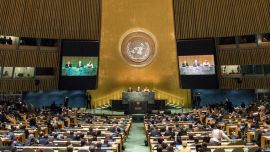Today is the last day of the Alberto Fernández Presidency, which will be the exclusive focus of the first part of this editorial, turning to the libertarian experiment of Javier Milei, who on its first day tomorrow.
Increasingly a lame duck this year, Argentina’s outgoing president triggers extremely negative opinion poll ratings when noticed at all – up to 86 percent of survey respondents describe his Presidency as “bad” or “very bad” (with two-thirds opting for the latter), as against the approval of only eight percent. But perhaps he could be most fairly described as an unlucky president who was lucky to be there in the first place.
Unlucky but there is also such a thing as making your own luck. In his farewell interviews, President Fernández invariably trots out his self-pitying list of misfortunes with the coronavirus pandemic followed by the Ukraine war and prolonged drought while an unpayable debt lurks in the background throughout. Ever since popularised by John Kennedy, one of the biggest clichés in political science has become to point out that the Chinese combine crisis and opportunity in the same word with two brush strokes (even if disputed by linguistic purists) – the crises listed by Fernández usually came with an opportunity.
If the President’s negative ratings are now as high as 86 percent, his popularity was not very far below that percentage in the second quarter of 2020 when a terrified nation rallied to the steady hand of “Captain Alberto” literally locking down the helm. Parachuted into the presidential nomination by Cristina Fernández de Kirchner’s accurate and perceptive calculation that his moderate image could attract enough of the middle ground to take the Peronist 2017 midterm vote of a third of the electorate up to around half, at the height of his popularity he had gained almost another third. This could not last – thus in New Zealand Jacinda Ardern’s star likewise rose with pandemic lockdown, only to fall without making the same mistakes – but similar displays of leadership on other fronts could have kept the momentum going. These displays never came while ‘Olivosgate’ (the first lady’s 39th birthday party breaking all quarantine rules) irreparably tarnished the image.
Ditto for the Russian invasion of Ukraine – tragic for that country, damaging even for an economic heavyweight like Germany but beneficial for Argentina which closed last year with a trade surplus of almost US$7 billion. That surplus could have been almost US$20 billion if Argentina had not had to import energy after years of populist pricing finally discouraged production to a point where self-sufficiency was lost since 2011. Yet that crisis was not translated into opportunity because that surplus was wasted on a struggle to uphold an unrealistic exchange rate.
It is obviously harder to detect anything remotely resembling an opportunity in the prolonged drought now mercifully ending. In all fairness, it must be said that any government would have had problems with a hole of US$20-plus billion being knocked into its export earnings – not just Frente de Todos whose ambitious public spending left it no other way of funding acquired rights and allied corporate interests than the inflationary printing of money. But even the debt negotiations with their massive costs could have been an opportunity to gain credibility without the approach of the debtor being the one to dictate terms.
The blame for economic disarray should also be shared with the corresponding minister. Fully 10 of the 16 quarters were in the hands of an obsessive specialist in debt negotiations with no real or at least clear macroeconomic vision (Martín Guzmán). At first sight the hyperactive Sergio Massa seems a distinct improvement on the supine Fernández but upon closer examination he turns the presidential procrastination into a virtue. Almost all his initiatives – virtually eliminating income tax and creating federal revenue-sharing chaos or boosting Central Bank reserves by buying farm export dollars dear only to sell them cheap – have backfired, leaving almost every indicator worse than under Guzmán. Hard as many might find it to believe, a Massa presidency could have been worse than this one.
The original sin of this President was, of course, having been named by his vice-president, the real leader of Kirchnerism bearing the surname, rather than the reverse. Just as multiplying anything by zero in mathematics gives you zero, so multiplying anything in politics by Cristina Fernández de Kirchner gives you Cristina Fernández de Kirchner. Perhaps a closer look at that lady as the power behind the throne or a less haphazard account of the last four years might have been more in order, but today belongs to Alberto Fernández.
---
The world’s first anarcho-capitalist president ever was a dogmatic firebrand throughout the campaign and a pragmatic navigator of transition – which of Javier Milei’s two faces will we be seeing in the presidency beginning today or will there be another incarnation altogether? The contradictions are not limited to his strambotic personality but permeate into the essence of his presidency – elected last month with the highest number of votes ever (14.5 million) in a hyper-presidential democracy, there has also never been a government with weaker parliamentary backing. Electoral victory does not guarantee successful government in more normal times (as we have seen with the last two coalitions) and facing him is possibly Argentina’s greatest crisis ever, with the potential to eclipse 1975, 1989 or 2001 – if Milei has miraculously escaped a bad hair day thus far, he is surely in for several now.
Drastic times call for drastic measures, of which Milei is a past master (in many ways the secret of his victory), but his extreme Congress weakness will force him to negotiate every step of the way. That run-off vote of almost 56 percent is deceptive – only 30 percent came from the previous two rounds of voting so that as much as a quarter of the electorate chose him as a lesser evil to a failed system rather than as any road into the future. Nor can even that 30 percent always be considered to be diehard loyalists. It is notorious that earlier in the year Milei had to draw many of his candidates from the ranks of his run-off rival Sergio Massa, given the relative shortage of lifelong libertarians, and, regardless of whether such people should be seen as Massa moles or (as seems more likely) opportunists correctly spotting the future winner, they are not the most reliable. In short, Milei may well depend on the kindness of not only strangers but even his friends when negotiating his ambitious state reforms.
Milei represents a uniquely novel phenomenon in many aspects – his communicational basis on social networks and the way the huge majority of an extreme right candidate owes far more to those expelled from the system than to the establishment – and yet there has been much of back to the future in the recruitment of his Cabinet, blasts from the past. The pre-run-off alliance with the PRO wing closest to ex-president Mauricio Macri is the most visibly tangible with his acolytes occupying three of the eight ministries, Economy, Defence and Security (the latter two at the expense of the new Vice-President Victoria Villarruel), even if Luis Caputo could be a transitional figure for the financial emergencies and the dirtiest work of the next few months, much like Jorge Remes Lenicov in 2002, rather than the intended architect of the deeper economic transformations.
Yet in many ways the more transformational 1989-1999 Carlos Menem Presidency could be more of a model for Milei, especially since the 1989 hyperinflation is more similar to the current context than the asymptomatic crisis which Macri had to tackle – if Menem died nearly three years ago, his nephew will now be Congress Speaker. And curiously enough, the closest parallel to Milei in the last 40 years in terms of fragility of support is Néstor Kirchner in 2003 with only 22 of the vote (and denied by Menem’s withdrawal a run-off in which he surely would have won well over 56 percent of the vote) – Kirchner’s construction of presidential authority via transversal alignments could well be a template for the new administration.
All we can say for now is that Javier Gerardo Milei and Victoria Eugenia Nair Villerruel will be inaugurated as president and vice-president of Argentina today – we cannot even talk about tomorrow when a massive state reform package or omnibus law is expected ahead of knowing its broad lines (or what may be hidden deep inside), even if some will rush to judgement with protests and strikes (with how the new government proposes to counter such resistance one of the big unknowns for the immediate future). It is impossible to take even such central pillars as dollarisation or elimination of the Central Bank at face value, after all the zigzags since first emerging as the possible next president after his PASO primary victory last August.
Milei has to be seen as a work in progress – even if many would see him as a piece of work. But one thing is certain – dollarisation or no dollarisation, he is where the buck stops, as from today.





















Comments